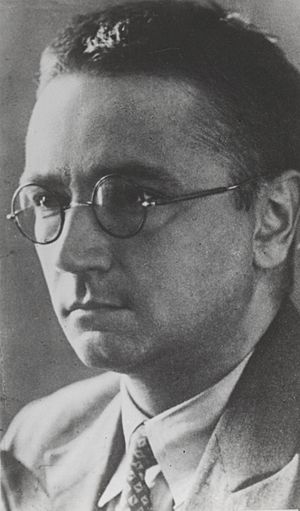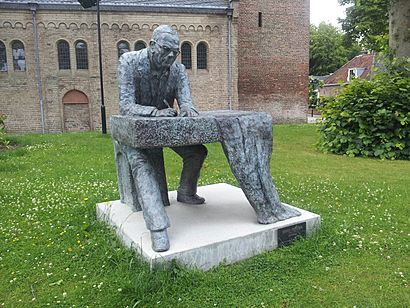Simon Vestdijk facts for kids
Quick facts for kids
Simon Vestdijk
|
|
|---|---|
 |
|
| Born | 17 October 1898 Harlingen, Netherlands |
| Died | 23 March 1971 (aged 72) Utrecht |
| Occupation | Novelist Essayist Poet Translator |
| Period | 1930-1971 |
| Genre | Historical novel, Psychological novel |
| Literary movement | Modernism |
| Notable works | Back to Ina Damman, Anton Wachter Cycle [8 novels; 1934-1960], The Garden Where the Brass Band Played, De kellner en de levenden |
| Notable awards | Constantijn Huygens Prize (1955) |

Simon Vestdijk (Dutch pronunciation: [ˈsimɔɱ ˈvɛzdɛik]; 17 October 1898 – 23 March 1971) was a Dutch writer.
He was nominated for the Nobel prize in literature fifteen times.
Life
Born in the small Frisian town of Harlingen, Vestdijk studied medicine in Amsterdam, but turned to literature after a few years as a doctor, including some time on board a ship. From 1932 he lived from literature. He became one of the most important 20th-century writers in the Netherlands. During the German occupation, he and other Dutch intellectuals were held hostage for some time, partly because they did not want to join the Chamber of Culture. After the war, he retired to Doorn (Utrecht province).
Vestdijk struggled with severe depressions from his youth, and until the end of his life.
His prolificness as a novelist was legendary (poet Adriaan Roland Holst saying of him that "he writes quicker than God can read"), but he was at least as important as an essayist on e.g., literature, religion, art, and music in particular. He also wrote much poetry and short stories. His work has been translated into several European languages. Some of his novels appeared as films in the cinema, or were broadcast on television.
See also
 In Spanish: Simon Vestdijk para niños
In Spanish: Simon Vestdijk para niños

